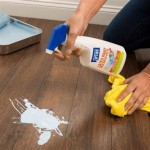Replacing Vinyl Flooring In Bathroom: A Comprehensive Guide
Transforming your bathroom with new vinyl flooring is a project that combines functionality and style. Vinyl flooring offers a durable, water-resistant, and versatile surface that can elevate the aesthetics of any bathroom. However, embarking on this endeavor requires careful planning and preparation. This guide will provide you with a comprehensive overview of the essential aspects of replacing vinyl flooring in a bathroom, empowering you to achieve a seamless and satisfying renovation.
Assessing the Existing Floor and Preparation
Before diving into the installation process, it's crucial to assess the existing floor. Determine if it is level, free from damage, and in good condition. If not, you may need to address any underlying issues, such as replacing subflooring or leveling the floor, to ensure a smooth and stable surface for the new vinyl flooring.
Once the floor is ready, remove all fixtures, such as toilets, sinks, and vanities. Clean the floor thoroughly, removing any dirt, debris, or old adhesive residue. This step ensures proper adhesion of the new vinyl flooring.
Choosing the Right Vinyl Flooring
The vast selection of vinyl flooring options can be overwhelming. Consider the following factors when making your choice:
- Type: Choose from sheet vinyl, vinyl tiles, or vinyl planks, each offering unique installation methods and aesthetics.
- Style: Vinyl flooring comes in a wide range of colors, patterns, and textures, allowing you to match your bathroom's décor.
- Durability: Some vinyl flooring options are more durable than others, so choose one that can withstand the wear and tear of a bathroom environment.
Installation Techniques
Vinyl flooring installation techniques vary depending on the type chosen. Follow these general steps for a successful installation:
- Sheet vinyl: Roll out the sheet vinyl, cut it to fit the room, and use adhesive to secure it to the floor.
- Vinyl tiles: Position the tiles according to the desired pattern and use an adhesive to fix them in place.
- Vinyl planks: Interlock the planks together with either a click-lock or adhesive system, creating a floating floor.
Seaming and Trimming
Seams are unavoidable when installing sheet vinyl or vinyl tiles. Use a seam welder or adhesive to create a watertight seal between the seams, ensuring the flooring's longevity.
Trim around the perimeter of the room to finish the installation. Use a utility knife or a saw to cut the excess flooring, ensuring a clean and professional-looking edge.
Maintenance and Cleaning
Maintaining your new vinyl flooring is essential for preserving its beauty and lifespan. Regular cleaning with a damp mop and non-abrasive cleaners is recommended. Avoid using harsh chemicals or abrasive cleaners, as they can damage the flooring.
With proper care and maintenance, your new vinyl flooring will provide years of enjoyment, enhancing the functionality and aesthetics of your bathroom.

How To Install Vinyl Plank Flooring In A Bathroom Fixthisbuildthat

Dos And Don Ts For Installing Vinyl Plank Floors In The Bathroom Advice Homeowners

How To Install Vinyl Plank Flooring In A Bathroom

How To Install Vinyl Plank Flooring In A Bathroom Fixthisbuildthat

How To Install Vinyl Plank Flooring In A Bathroom

Vinyl Planks In Bathrooms Residential Inspiration Flooring

Dos And Don Ts For Installing Vinyl Plank Floors In The Bathroom Advice Homeowners

How To Install Vinyl Plank Flooring In A Bathroom As Beginner Home Renovation

Installing Vinyl Plank Flooring Lifeproof Waterproof Rigid Core Sustain My Craft Habit

How To Install Vinyl Sheet Flooring A Erfly House
See Also







